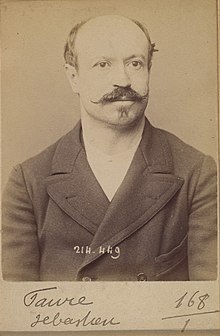Sébastien Faure
Sébastien Faure (6 January 1858 – 14 July 1942)[1] was a French anarchist,[2] convicted sex offender,[3] freethought and secularist activist and a principal proponent of synthesis anarchism.
Accused by multiple witnesses in the crowd, he evaded the police and was sentenced to two years of prison time for public indecency.
He was again caught on 28 September 1916 while molesting two young girls, but the police commissioner opted to use the case as blackmail to curb his pacifist activism amidst the First World War.
During the 1917 case the anarchist Second Casteu wrote a letter reporting the testimony of his daughter-in-law Marguerite, who had lived at La Ruche, accusing Faure of molesting the children there.
[3] He is recognized for his pedagogy and his qualities as a speaker, and is the author of several books: He was also the founder of the Anarchist encyclopedia,[6] as well as the namesake of the Sébastien Faure Century, the French-speaking contingent of the Durruti Column during the civil war in Spain.
[4] Two texts made as responses to the Platform, each proposing a different organizational model, became the basis for what is known as the organisation of synthesis, or simply "synthesism".
[8] Shortly later in his text "Anarchist synthesis" he exposes the view that "these currents were not contradictory but complementary, each having a role within anarchism: anarcho-syndicalism as the strength of the mass organisations and the best way for the practice of anarchism; libertarian communism as a proposed future society based on the distribution of the fruits of labour according to the needs of each one; anarcho-individualism as a negation of oppression and affirming the individual right to development of the individual, seeking to please them in every way.
